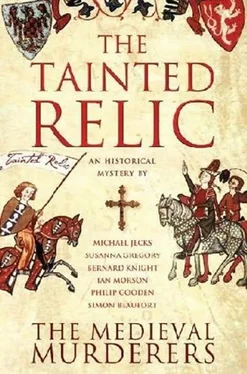There was no porter on the gate and he went along a stony path that led around to the entrance. Near by, a barefoot monk was hoeing weeds between rows of onions, a dark Benedictine habit hoisted up between his bare thighs and tucked into his belt. He straightened up and stared curiously at the visitor, who held up his hand in a blessing and dredged some appropriate Latin greeting from his memory.
‘I wish to speak with the prior,’ he said, reverting to common English.
‘Ring the bell at the door, Brother,’ replied the gardener, pointing at an archway.
He did so. A young novitiate appeared and, after enquiring about his business, led him along a short, gloomy passage and knocked at the door of the prior’s parlour.
Inside, Gervase found the head of the establishment seated behind a small table, some parchments before him and another pale young brother seated at his side, wielding a quill pen. Prior Vincent was a small man with an almost spherical head. He had no tonsure, for he was completely bald, and his face was moon shaped to match. Given his small eyes and prim, pursed mouth, Gervase felt that he was not the ideal customer for a sacred relic, but he had little choice in the matter.
With the novitiate lurking behind him, the other two monks stared enquiringly at this rather shabby priest who stood before them.
‘What can we do for you, Brother? Are you seeking bed and board on your travels?’ asked the prior, in a high, quavering voice.
The renegade priest falsely explained that he was from a parish in North Somerset, on his way home from a pilgrimage to Santiago de Compostela and recently landed from a ship at Plymouth. Gervase followed his habit of sticking as close to the truth as possible, as he had once been a pilgrim to Santiago many years before and could fabricate a convincing story about it if challenged. He chose Somerset for his parish as this was in a different diocese from Exeter and it would be less likely that anyone here would be familiar with any of the incumbents from that area.
‘I would be grateful for a little food and drink, but I have no wish to impose upon you for a night’s lodging,’ he said piously.
The prior nodded, relieved that they were spared the trouble and expense of putting up an unexpected guest. ‘Young Francis here will see that you get something in the kitchen, before you go on your way.’
He said this with an air of finality and picked up a parchment roll again, but Gervase had not finished. ‘There is one thing more which may interest you, Prior. I will admit that after six months’ journeying, I am destitute, my last coins being spent on the passage from St-Malo to Plymouth.’
The prior suppressed a groan, thinking that here was another impoverished priest looking for a handout, but his suspicions were dispelled by Gervase’s next words.
‘I came across a remarkable item on my travels which I felt might interest some religious house in England. I intended taking it to Wells or perhaps Winchester, but as I find myself in Exeter with virtually no funds to continue my journey, I thought to offer it here first.’
Prior Vincent was intrigued, but he was not altogether satisfied with this scruffy clerk who had wandered in from the street.
‘Why, then, did you not go first to the cathedral?’
The outlaw had anticipated this question-he had deliberately avoided the cathedral, where the far larger complement of priests increased the risk of his being recognized.
‘I had heard of St Nicholas Priory and knew it to be a daughter of Battle Abbey, whose fame is known far and wide. It occurred to me that you might relish the opportunity to secure the object to present to your abbot, gaining his gratitude and respect.’
The flattery was not lost on the prior, who could also benefit from some extra goodwill from his superior at Battle, the abbey near Hastings erected by William the Bastard to commemorate the great victory of the Normans that gave them England.
‘What is this remarkable object?’ he snapped. ‘Not yet another piece of the True Cross, I hope?’ he added sarcastically.
Gervase managed not to look discomfited as he admitted that, indeed, it was. ‘But with a great difference, Prior, from the usual dross that unscrupulous relic merchants hawk around. This has undoubted authentication.’
He bent to open his satchel and took out the faded gilt box, removing it from its leather wrapping and handing it to the bald monk.
‘Pray read the message on the parchment in the box-and be sure to study the seal upon it,’ he recommended.
There was a silence as the curious prior, with his even more inquisitive clerk craning his head over his master’s shoulder, looked at the glass tube and read the letter from Sir Geoffrey Mappeston.
‘I have heard of that knight,’ volunteered the clerk. ‘He was a famous Crusader earlier this century!’
‘So have I, boy,’ retorted Anselm testily, fingering the seal attached to the parchment. ‘It certainly seems a genuine note. Whether or not the relic is authentic is another matter.’ He jerked his round face up towards the visitor. ‘How did you come by this?’ he demanded. ‘Did you steal it from some cathedral in France or Spain?’
‘Indeed I did not!’ exclaimed Gervase indignantly. ‘I bought it at considerable expense from a relic dealer near Chartres, whom I succoured when he was in distress.’ He spun an inventive yarn about helping a man whose horse had bolted, leaving him on a lonely road with a broken leg. In return, the dealer had let him have the relic at a reduced, but still substantial, price, which accounted for Gervase’s present poverty.
‘For the good of my soul, I would sell it for no more than I gave for it, at no profit,’ he said piously. ‘Such a relic would be a valuable acquisition for any religious house and repay its cost a thousandfold from the offerings of the pilgrims that it would attract. One only has to look to Glastonbury Abbey to see what riches they have amassed since they discovered the bones of King Arthur and his queen there!’
He said this with a sly grin, in which the other men joined with conspiratorial smirks of disbelief at the enterprise of their Somerset brothers. Prior Vincent turned over the ancient tube thoughtfully and stared at the contents with a mixture of reverence and scepticism. Then he reread the faded words on the parchment and studied the seal more closely.
‘How much do you want for this?’ he asked eventually, peering pugnaciously at the man opposite.
‘What I paid for it, the equivalent of thirty marks,’ lied Gervase.
The prior put the vial on his table as if it had suddenly become red hot.
‘Twenty pounds! Impossible, that’s more than a year’s income for this little place. You should be willing to donate such a sacred object to us for the good of your mortal soul, not trying to extort such a huge sum from your own brothers!’
Gervase was in no mood to start bargaining with the very first customer he came across.
‘Would that I could afford to, Prior-but I sold all I had to fund my pilgrimage and now have nothing in the world. My living in Somerset has been given to another in my absence and I am not sure of finding a new stipend on my return. I have to recover this money in order to live!’
The rotund priest opposite was not impressed by this plea. He pushed the box, tube and parchment back across the desk towards Gervase.
‘Then you had better give this to your bishop as a bribe for a new living-I certainly can’t afford a third of that price, much as I would like to present it to my own abbot.’
As the outlaw retrieved his property, he concealed his disappointment philosophically, consoling himself with the knowledge that this was the first attempt at a sale and there were several other opportunities.
Читать дальше












